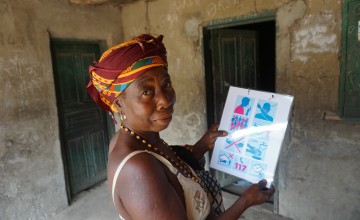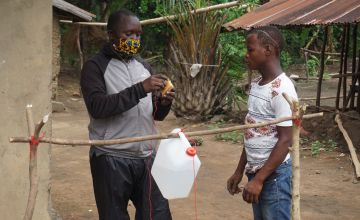
Read our 2024 annual report

Knowledge Hub
Covid-19 Response Process Evaluation Sierra Leone 2021
The COVID-19 Response project was funded by Irish Aid and implemented by a consortium of Concern Worldwide (lead), GOAL and Trócaire.

The project's overall objective was "to strengthen community's resilience to prevent and reduce the spread and impact of the coronavirus pandemic" in nine districts in Sierra Leone.
The evaluation found that an adaptive and reflective approach was clearly articulated in the project design phase and incorporated in the original proposal as a critical element of project success. Contextual changes and the potential for shifts in priorities were anticipated in the design as risks that would be mitigated by an adaptive approach.
Project adaptations to respond to other shocks besides COVID-19 were anticipated, and the project proposal included a statement of intention to seek approval from the donor for adaptation and budget realignment in the event of other shocks.
There was an emphasis on using data to inform decision-making to ensure vulnerable groups were served, and the project produced the intended results. The consortium partners monitored the external environment in the changing pandemic context and used external and internal data sources to identify the need for change. The original project proposal was revised to articulate the changing context and the changes in assumptions on which the implied project theory of change was built.
Evidence from project reports, focus group discussions, and key informant interviews point to the fact that the adaptive approach promoted humanitarian standards such as targeting and account-ability, among other attributes. In terms of targeting, the project used available secondary and primary data sources and needs assessments to identify needs for change. The feedback received from local partners and stakeholders were relied on to make changes.

Lessons learnt
- An adaptive approach to programming can work in an emergency context without budget overruns if deliberately incorporated in the project design and thoughtfully implemented using evidence to inform adaptations and an information system to facilitate a continuous learning cycle.
- Working closely with national structures and local stakeholders improves the relevance and potential effectiveness of adaptations. However, the expectations of local stakeholders for participation in project activities and their timelines for the completion of response activities and sharing of critical information on which project interventions depend were not always in sync with project plans. The expectations of these stakeholders should be anticipated and effectively managed, and provisions made to strengthen anticipated weaknesses in local structures to ensure timely service delivery.
- The participation of women in project activities was lower than planned. This gender disparity is typical in national and local emergency response structures, with which the project collaborated. A gendered adaptive approach to programming that is not only gender-sensitive but also gender-transformative should go beyond the use of formal tools to assess the level of integration of gender. It would require additional efforts to improve the participation of women in project decision-making.
- The operationalisation of a high-level management team to promote learning and facilitate adaptations is only likely to lead to timely delivery of activities if the team is empowered to authorise budget allocations under pre-specified conditions without recourse to the donor when the evidence supports adaptations.
The ideas, opinions and comments herein are entirely the responsibility of the author(s) and do not necessarily represent or reflect Irish Aid policy.




